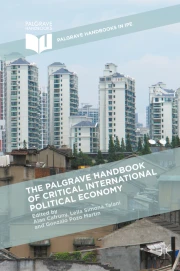The Palgrave Handbook of Critical International Political Economy

This is a preview of subscription content, log in via an institution to check access.
Access this book
Subscribe and save
Springer+ Basic
€32.70 /Month
- Get 10 units per month
- Download Article/Chapter or eBook
- 1 Unit = 1 Article or 1 Chapter
- Cancel anytime
Buy Now
eBook EUR 181.89
Price includes VAT (France)
Hardcover Book EUR 232.09
Price includes VAT (France)
Tax calculation will be finalised at checkout
Other ways to access
About this book
Challenging the assumptions of ‘mainstream’ International Political Economy (IPE), this Handbook demonstrates the considerable value of critical theory to the discipline through a series of cutting-edge studies. The field of IPE has always had an inbuilt vocation within Historical Materialism, with an explicit ambition to make sense, from a critical standpoint, of the capitalist mode of production as a world system of sometimes paradoxically and sometimes smoothly overlapping states and markets. Having spearheaded the growth of a vigorous critical scholarship in the 1960s and 1970s, however, Marxism and neo-Gramscian approaches became increasingly marginalized over the course of the 1980s. The authors respond to the exposure of limits to mainstream contemporary scholarship in the wake of the onset of the Global Financial Crisis, and provide a comprehensive overview of the field of Critical International Political Economy. Problematizing socioeconomic and political structures, and considering these as potentially transitory and subject to change, the contributors aim not simply to understand a world of conflict, but furthermore to uncover the ways in which purportedly objective analyses reflect the interests of those in positions of privilege and power.
Similar content being viewed by others

Introduction: International Political Theory as a European Theoretical Tradition
Chapter © 2021

Conclusion: Towards a Critical, Global Comparative Political Economy
Chapter © 2015

Introduction: The Globalisation Debate—From De-Globalisation to the Dark Side of Globalisation
Chapter © 2019
Keywords
- Global Financial Crisis
- Atlanticism
- Global Organic Crisis
- Marxism
- Neo-Gramscianism
- Transnationalism
- Hegemony
- Feminism
- Capitalism
- Security
- Inequality
- Neoliberalism
- Migration
- Arab Spring
- Trasformismo
- Intellectual Property rights
- Globalization
- BRICs
- European Union
- EU-MENA relationship
Table of contents (22 chapters)
Front Matter
Pages i-xvii
Introduction
Theory
Front Matter
The Transatlantic Imperium After the Global Financial Crisis: Atlanticism Fractured or Consolidated?
Critical Global Political Economy and the Global Organic Crisis
Pages 29-48
Marxism: and the Very Idea of Critical Political Economy
Pages 49-65
Neo-Gramscians and IPE: A Socio-Economic Understanding of Transnationalism, Hegemony and Civil Society
Pages 67-83
Feminism and Critical International Political Economy
Pages 85-100
Critical International Political Economy and Method
- Johannes Jäger, Laura Horn, Joachim Becker
Pages 101-118
Development and the Outer Periphery: The Logic of Exclusion
Pages 119-137
Issues
Front Matter
Pages 139-139
US Foreign Policy from a Critical International Political Economy Perspective: Capitalist Empire and the Social Sources of Grand Strategy
Pages 141-162
Being Critical About Security: What Critical Political Economy Says About Security and Identity
Pages 163-180
Inequality and Poverty in the Neoliberal Era
Pages 181-207
The Migration Crisis Before and After the Arab Spring: A Transnationalist Perspective
Pages 209-237
Crises as Driving Forces of Neoliberal “Trasformismo”: The Contours of the Turkish Political Economy since the 2000s
Pages 239-266
Energy, Capital as Power and World Order
Pages 267-287
Coming in from the Cold: Intellectual Property Rights as a Key International Political Economy Issue
Pages 289-306
Regional Analysis
Front Matter
Pages 307-307
Globalizing China: A Critical Political Economy Perspective on China’s Rise
Pages 309-329
Editors and Affiliations
Hamilton College , New York, USA
King's College London , London, United Kingdom
University of Stockholm, Grojecc, Sweden
About the editors
Alan Cafruny is Henry Platt Bristol Professor of International Affairs at Hamilton College, USA, and former Visiting (1993-4) and External (1994-2000) Professor at the European University Institute, Italy. In 2013-14 he was Fulbright Scholar at the Higher School of Economics National Research University in Moscow, Russia. Alan has written numerous books and articles in the areas of international political economy, the political economy of the European Union and U.S. foreign policy.
Leila Simona Talani is Professor of International Political Economy at the Department of European and International Studies, Kings College London, UK, where she was appointed Jean Monnet Chair of European Political Economy in 2012. She has previously held posts at the London School of Economics and the University of Bath, UK, and was Associate Expert for the United Nations Regional Office for Drug control and Crime Prevention in Cairo, Egypt. Simona has written extensively on European political economy, the political economy of international migration, and on the Economic and Monetary Union.
Gonzalo Pozo Martin is an independent researcher associated with the ‘Vision of Eurasia’ project, based at Södertörn University, Stockholm, Sweden. He was previously Lecturer in International Political Economy at the Department of European and International Studies, King’s College London, and Lecturer in International Relations at Goldsmiths College, University of London. He has also held University of London posts at SOAS and Birkbeck College. His work has concentrated on the Marxist Theory of Imperialism, geopolitics, and Russian foreign policy and political economy.
Bibliographic Information
- Book Title : The Palgrave Handbook of Critical International Political Economy
- Editors : Alan Cafruny, Leila Simona Talani, Gonzalo Pozo Martin
- Series Title : Palgrave Handbooks in IPE
- DOI : https://doi.org/10.1057/978-1-137-50018-2
- Publisher : Palgrave Macmillan London
- eBook Packages : Political Science and International Studies , Political Science and International Studies (R0)
- Copyright Information : The Editor(s) (if applicable) and The Author(s) 2016
- Hardcover ISBN : 978-1-137-50017-5 Published: 01 September 2016
- eBook ISBN : 978-1-137-50018-2 Published: 05 July 2016
- Series ISSN : 2946-403X
- Series E-ISSN : 2946-4048
- Edition Number : 1
- Number of Pages : XVII, 469
- Number of Illustrations : 7 b/w illustrations, 9 illustrations in colour
- Topics : International Political Economy , Political Theory , Critical Theory , International Organization , Political Philosophy , Foreign Policy

